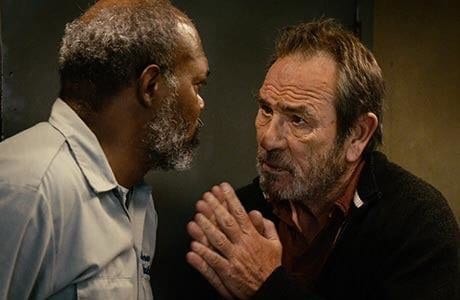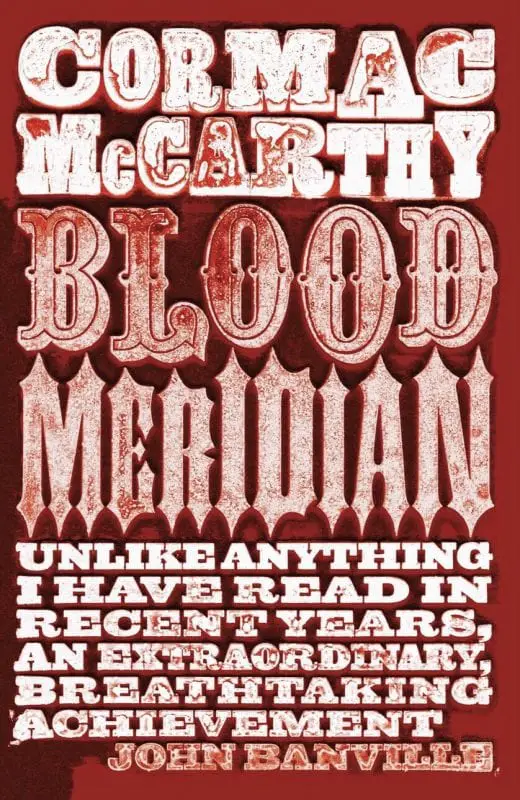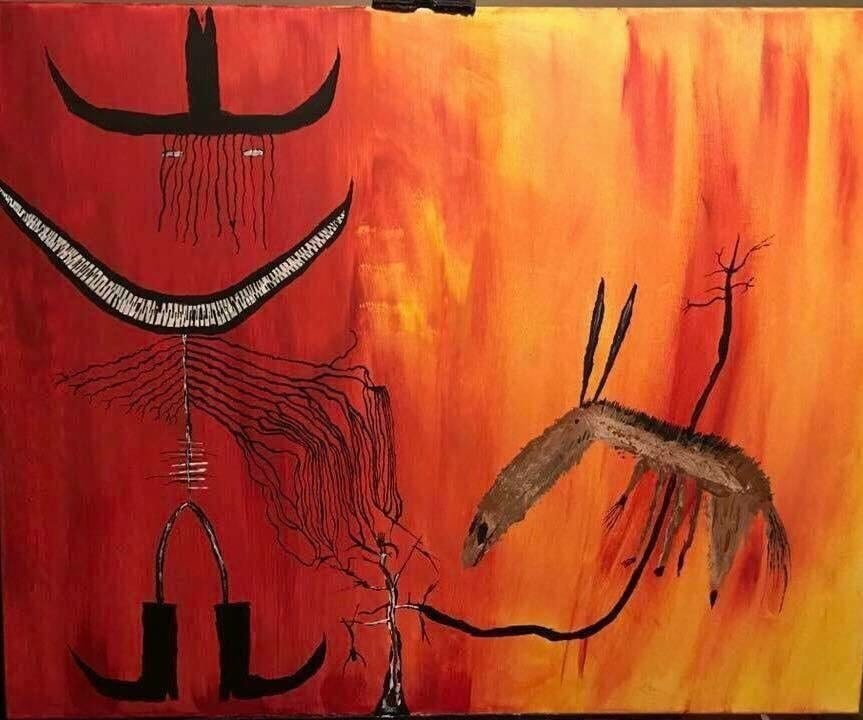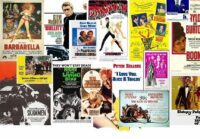“On-Screen, Off-Screen” is our new monthly film series created to showcase a more personal retrospective about some of our favourite filmmakers. Each month, one 25YL staffer will choose one of their own favourite filmmakers – be it a director or performer or writer or composer or production designer, etc – and will analyse what it is about their on-screen work that they love, and how they’ve been influenced/inspired by them off-screen either personally or creatively or artistically. Maybe one of us will write about the entire filmography of a director, or someone might choose an actor associated with playing a certain role multiple times, or maybe there’s that one soundtrack by a composer that gets them every time. This month sees Josh Lami writing about how the words of Cormac McCarthy have influenced him as a writer and an artist. Enjoy!
There’s a key to understanding McCarthy, I believe. It’s simple to comprehend, difficult to achieve. First, understand there is much beauty to be found in tragedy. Second, you must understand the concept of appreciating something as it happens, and when it happens, rather than searching for a meaning to suit you. Not everything has meaning, in fact most things don’t, and the things you want to be true are not always true. You can accept a moment or an experience as it happened, taking from it what was there to take, or you can try to impose your will upon it. Don’t do the latter.
On rare occasions, a moment in time will evolve into permanence and become a fixture, but it’s the nature of a moment to be fleeting, trailing off just as quickly as it comes into focus. As the universe is merciful, we usually don’t realize what we missed. But sometimes a passing moment reveals itself just as our senses are tuned, and we’re searching desperately for a sparkle out among the dreck. It’s tempting to reach out and try to keep such a moment for yourself, but capturing a butterfly doesn’t give you vibrant, colorful wings. It only kills the butterfly.
I’ve been painting for a few years and I’m not any good, but I love doing it, so I’ll continue. I used to sometimes paint with a friend of mine on certain nights. One night when she was feeling especially lonely, and I was in my regular place of despair, we sat up the entire night painting, drinking beer, and listening to music. We didn’t talk much. It was an evening of relatively few words. It’s something to connect with another human being, but it’s a special thing to share loneliness. Not to try to alleviate it, not to offer comfort, but to sit in a room and be openly lonely alongside another person doing the same. To share your moment of vulnerability without fear of judgement. To know the other understands, and is in a similar place. To sit, rejected by the world, creating art, silent, because there’s nothing to say. You both already know, and it’s fine. Everything is fine.
Inside Out touched on this concept of accepting your sadness a bit, and did a great job. Cormac McCarthy writes stories that seem to celebrate the awful truths we deal with on a daily basis, hiding those truths behind something amazing. One night, in 2011, I actually observed my own perspective changing in real time as my wife and I watched The Sunset Limited. As an atheist, the godless view expressed by Tommy Lee Jones wasn’t shocking. What blew my mind was his commitment to nihilism. If you haven’t seen The Sunset Limited, stop reading this and go do that. There’s a moment towards the end where the character of “White” explodes into a soliloquy of existential prose that could corrupt the innocence of a basket of puppies. Hopeless, yes, but beautiful.
“I don’t believe in God. Can you understand that? Look around you man. Can’t you see? The clamor and din of those in torment has to be the sound most pleasing to his ear. And I loathe these discussions. The argument of the village atheist whose single passion is to revile endlessly that which he denies the existence of in the first place. Your fellowship is a fellowship of pain and nothing more. And if that pain were actually collective instead of simply reiterative, then the sheer weight of it would drag the world from the walls of the universe and send it crashing and burning through whatever night it might yet be capable of engendering until it was not even ash.”

After the movie ended, I was dumbfounded. It affected me in a way I still can’t explain. If I’d never watched The Sunset Limited, I’d be a different person today. For two weeks straight I watched it every night. It had never occurred to me language could be simultaneously haunting and yet so beautiful. Before seeing Sunset, I’d seen No Country for Old Men, but had never heard the name Cormac McCarthy before. Turns out he’s a celebrated author and a legend in writer circles. His book, Blood Meridian, is considered one of the greatest American novels ever written, by just about every literary scholar on the planet. Where the hell have you been, Josh? So, I bought Blood Meridian against everyone’s recommendation. All the people I asked about McCarthy warned me to start with something in his bibliography a little easier to digest.
Blood Meridian is the most difficult read I’ve ever undertaken, and I’ve read Moby Dick. Similar to Moby Dick, Blood Meridian doesn’t care about rules in writing. Obsolete, archaic words are used throughout with zero explanation as to what they might mean. McCarthy doesn’t use quotation marks to denote dialogue. Characters break into untranslated Spanish without warning. Punctuation is sparse, run-on sentences go for entire pages. One day I’ll try Ulysses, which I’m told is even more difficult than Meridian. If you’re only familiar with YA fiction, Blood Meridian is going to take you a solid month to read, and it’s only a little over 300 pages. Also, it’s perhaps the most violent book ever written, the violence never relents. It’s humorous, but darkly so. A preacher stands accused of “having congress with a goat.” Then he is murdered by his own congregation in the revival tent.
It was funny to me.
Tough to get through, but I absolutely loved it. Over the next few weeks I read nearly all of McCarthy’s work and became obsessed with him for some time.

This is why I began taking writing seriously. McCarthy taught me, before anyone else did, that I can write whatever I want to write. There are virtually no rules. He showed me what it is to meander about the page, keeping excess, while trimming away oppressive plot development.
Now, I don’t read writing tips. I never have, but occasionally I’ll come across some sage wisdom telling me great writers are always reading. Well, I have no hope of becoming a great writer, because I’m not always reading. For me, reading comes in waves. Sometimes I’ll go six months without picking up a book, but when I do get the itch to read, I can’t stop for weeks at a time. Binge reading, I call it. What happens is, I discover an author and will want to read everything they’ve released, as quickly as possible. Then I take a bit of their influence with me and put it to good use, in my writing. The further away I get from reading something, the more my influences can settle seamlessly into my style and not be so jarringly derivative.
When I first finished McCarthy, everything I wrote was wordy prose and I just wanted to write about depressed cowboys. As time has gone on, I’ve realized that isn’t exactly what I have to do, but I did keep McCarthy’s lack of regard for reader comfort firmly in place. When you read McCarthy, you are reading at his pace, at his cadence, and it’s his presentation. Likewise, when I write, the reader is going to go wherever I want to take them. If a sentence feels better to me as a fragment or run-on, I keep it. Pandering is something I don’t know how to do, or if I do know how, I have no desire to.
Also, from my “McCarthaissance” is my tone of underlying nihilism, futility, and/or existentialism. Truth be told I don’t know anything about Cormac McCarthy as a person. He may detest nihilism. Perhaps he’s a born-again Christian. I don’t know where he stands on any issue because he’s extremely private and rarely does interviews. His books defy interpretation as they’re almost in opposition to any “moral of the story” way of thinking, and he’s 84, so I don’t foresee him changing. More importantly, who he is as a person isn’t any of my concern, nor should it be. He writes books and films I love and relate to. That’s all I know. That’s all I need to know.
For me, the reason I was so moved by The Sunset Limited and all his other books is that McCarthy pulled something to the forefront of my mind imprisoned by my subconscious – it was only making itself known in negative ways. Atheism was not right for me, and I knew that deep down. In truth, I was, and remain, a presumably unshakable nihilist. Most people think of nihilism as either a wonderful plot device within The Big Lebowski, or as a seemingly hip point of view for edgelords the world over.
Fair.
As for me, I’m not the kind of nihilist who wants to sit around talking about how life is meaningless and therefore I want to die. Actually, I don’t want to die at all. Life is okay by me, I just don’t have any beliefs, in anything really. Does God exist? Is there an afterlife? Is morality even real? My answer to all those questions is, “probably not, but I also don’t care about any of that shit.” Personally, I find the futility of existence liberating. This point of view allows me to stop asking such riveting questions as “why me” in response to perceived negative situations.
None of this is personal.
This is the way it is. This way, and not some other way.
Positive nihilism, some call it. Nothing has any inherent value other than what we place on it, but it’s great that we do place value on things, it means we care about things and people even though we don’t have to. Morality isn’t objective, it’s chosen. Isn’t that sweet? I think so. Sometimes we even invite other species of animals to come live in our homes, just because we like their company. At times, humanity is downright adorable. There are a lot of awful things we do, but I never said everyone was good. “Goodness” isn’t even a force I technically believe exists.
All I’m saying, is I find a lot of beauty in the compassion we voluntarily bestow upon other people and animals. That’s what gives my life meaning, even though I know in grand scheme of the universe it technically has none.
Cormac McCarthy made me stop being angry and bitter about people having faith, and understand that some of them really need it. It doesn’t make them stupid or weak, it makes them human. He made me come to terms with the fact that I’m incapable of belief, but predisposed to recognizing the endearing patterns and bewildering intricacies within the details of futility, and then I opted for sentiment over indifference. In doing so, I surprised myself, and I’m stronger for it. Perhaps not religion, but McCarthy did help me find my way to drawing strength from abstraction. Writing, yes, but art in general. Observing it, creating it, simply being in the presence of it.
McCarthy uses brutal, ugly truth to drive home an unmistakable sense of bleakness, but he uses a gorgeous method in which to do so, namely the elegance of his prose and his use of language in general. He’s reminding us that although the world is neutral and the realities of it morbid, there’s luster surrounding us at all times, if only we’ll stop to notice. Is his prose excessive and wordy? Hell yes. That’s the point.
He’s asking you to linger. Appreciate the present.
Stop searching for meaning and resolution, you’re not going to find it. Look at the pretty words.
One of my favorite paintings of my own is inspired by Blood Meridian, titled “The Judge’s Violent Liberation of Donkey Rabbit.” The Judge is a terrifying character in Blood Meridian; Donkey Rabbit is just a strange animal I made up to play the Judge’s victim in the painting. So, I’ll leave you with that painting.





“Existentialist” is maybe the best word.
Philosophical terms like existentialism, nihilism, etc… have such a subjective meaning, it can be difficult to really pin down where you stand with those terms. There are different versions of both existentialism or nihilism today, and then also the terms have evolved to be more or less inclusive over time.
One of the absolutely great American novelists. Not flawless, not above criticism, or even above mere dislike (for his relentlessly grim and violent male-dominated landscapes). But a visionary writer who is committed to his craft and doesn’t flinch from the existential challenges that confront him. I began with ALL THE PRETTY HORSES, which I resisted for years because it was a “Western” with a kind of Huck-Finn-on-horseback narrative. Loved it and then read the other two volumes in his Border Trilogy and wanted more. So I read BLOOD MERIDIAN and was dazzled and disturbed, especially by the Judge and can still hear the diabolical foot-stomping dancing at novel’s end. Hungry for more, I still hesitated with NO COUNTRY FOR OLD MEN, which had been reviewed as if it were a quickly dashed-off potboiler compared to previous work. When I actually read it, I found it faster-paced and much more compressed but still very profound and even moving (feelings reaffirmed for me in the Coen Brothers pitch-perfect film adaptation). Resisted the end-of-the-world bleakness of THE ROAD but finally read it and was again rewarded. Finally, after several tries and years of prodding from a friend, I went back to Cormac’s southern roots and read his stunning Knoxville novel, SUTTREE. He’s something else.
Definitely a force to be reckoned with, as a writer.